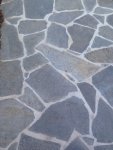I've read back through this comparison before on here.
It seems most favor Pentair Intelliflo VS over Hayward Ecostar, even though efficiency tests show Ecostar a clear winner, at least, from the settings used in the test:
3450 RPM
Intelliflo: 97 GPM, 2720 Watts, 2.14 Gallons/Watt-hr
EcoStar: 98 GPM, 2324 Watts, 2.53 Gallons/Watt-hr
1000 RPM
Intelliflo: 30 GPM, 140 Watts, 12.86 Gallons/Watt-hr
EcoStar: 28 GPM, 90 Watts, 17.5 Gallons/Watt-hr
Sounds great for Ecostar, but I also read their lowest speed to be 1000 RPM, while Intelliflo can slow to 600 RPM. If that is true, and since these are programmable pumps, if your pool is small enough to turn over quick enough, wouldn't you run the Intelliflo at 600 RPM (unless your heater or SWG required more flow)?
It seems the 600 RPM speed would make a gigantic impact on efficiency... just running the pump longer.
I have a 26k gal pool, and am trying to design all new mechanics. So I know I also have to consider what I will use to auto control the pump when picking brands.
It seems like (if I figure right) I could get about 1 complete turnover in 24 hours at 600 RPM with the Intelliflo. Is 1 turnover sufficient in the Kansas summer heatwave climate with a SWG?
Anyone have advice here?
It seems most favor Pentair Intelliflo VS over Hayward Ecostar, even though efficiency tests show Ecostar a clear winner, at least, from the settings used in the test:
3450 RPM
Intelliflo: 97 GPM, 2720 Watts, 2.14 Gallons/Watt-hr
EcoStar: 98 GPM, 2324 Watts, 2.53 Gallons/Watt-hr
1000 RPM
Intelliflo: 30 GPM, 140 Watts, 12.86 Gallons/Watt-hr
EcoStar: 28 GPM, 90 Watts, 17.5 Gallons/Watt-hr
Sounds great for Ecostar, but I also read their lowest speed to be 1000 RPM, while Intelliflo can slow to 600 RPM. If that is true, and since these are programmable pumps, if your pool is small enough to turn over quick enough, wouldn't you run the Intelliflo at 600 RPM (unless your heater or SWG required more flow)?
It seems the 600 RPM speed would make a gigantic impact on efficiency... just running the pump longer.
I have a 26k gal pool, and am trying to design all new mechanics. So I know I also have to consider what I will use to auto control the pump when picking brands.
It seems like (if I figure right) I could get about 1 complete turnover in 24 hours at 600 RPM with the Intelliflo. Is 1 turnover sufficient in the Kansas summer heatwave climate with a SWG?
Anyone have advice here?


